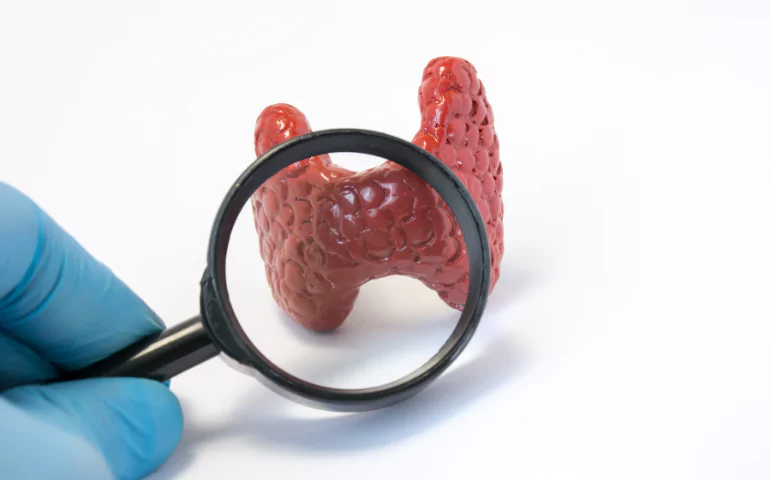
Introduction
Begin with an overview of the thyroid gland’s vital role in regulating metabolism, energy levels, and overall health. Introduce the thyroid-stimulating hormone (TSH) lab test as a crucial tool in assessing thyroid function and diagnosing thyroid disorders.
The Thyroid And TSH
Explain the anatomy and function of the thyroid gland, emphasizing its production of thyroid hormones, including thyroxine (T4) and triiodothyronine (T3). Discuss the role of TSH, produced by the pituitary gland, in regulating thyroid hormone levels by stimulating thyroid hormone synthesis and secretion.
Indicating For TSH Testing
Discuss the signs and symptoms that may prompt healthcare providers to order a TSH test, including:
• Fatigue
• Weight changes
• Changes in appetite
• Cold intolerance
• Heat intolerance
• Irregular menstrual cycles
• Hair loss
• Mood changes
• Muscle weakness
• Difficulty concentrating
Interpreting TSH Levels
Explain how TSH levels are interpreted in the context of thyroid function, including
• Normal TSH range (typically between 0.4 and 4.0 milli-international units per liter [mIU/L]).
• Hypothyroidism: Elevated TSH levels indicate an underactive thyroid gland.
• Hyperthyroidism: Decreased TSH levels suggest an overactive thyroid gland.
• Subclinical thyroid disorders: TSH levels outside the normal range with normal thyroid hormone levels.
• Secondary or tertiary hypothyroidism: Abnormal TSH levels due to pituitary or hypothalamic dysfunction.
Diagnostic Considerations
Discuss additional thyroid function tests, such as free T4 (FT4), free T3 (FT3), thyroid peroxidase antibodies (TPO antibodies), and thyroglobulin antibodies (TG antibodies), to further evaluate thyroid function and diagnose specific thyroid disorders.
Clinical Management
- Hypothyroidism: Treatment with synthetic thyroid hormone replacement therapy (levothyroxine).
- Hyperthyroidism: Medications (such as antithyroid drugs), radioactive iodine therapy, or thyroidectomy.
- Monitoring and follow-up: Regular TSH testing to assess treatment response and adjust medication dosages as needed.
The parameters typically included in a thyroid profile test, also known as a thyroid function panel, may vary depending on the laboratory and healthcare provider’s preferences. However, a comprehensive thyroid profile test usually includes measurements of the following thyroid hormones and markers:
Thyroid – Stimulating Hormone [TSH]
• TSH is produced by the pituitary gland and stimulates the thyroid gland to produce thyroid hormones (T3 and T4).
• Elevated TSH levels may indicate an underactive thyroid gland (hypothyroidism), while decreased TSH levels may suggest an overactive thyroid gland (hyperthyroidism).
Free Thyroxine [FT4]
• FT4 is the active form of thyroxine (T4) that is available for use by the body’s tissues.
• FT4 levels reflect the amount of thyroid hormone circulating in the bloodstream.
• Abnormal FT4 levels can indicate thyroid dysfunction, such as hypothyroidism or hyperthyroidism.
Triiodothyronine [T3]
• T3 is another thyroid hormone that plays a role in regulating metabolism and energy production.
• T3 levels may be measured to assess thyroid function and diagnose thyroid disorders.
• Abnormal T3 levels may indicate thyroid dysfunction, although T3 levels are less commonly used in isolation for diagnosis compared to TSH and FT4 levels.
Thyroid Peroxidase Antibodies [TPO Antibodies]
• TPO antibodies are antibodies produced by the immune system that target thyroid peroxidase, an enzyme involved in thyroid hormone production.
• Elevated TPO antibody levels may indicate autoimmune thyroid disorders, such as Hashimoto’s thyroiditis or Graves’ disease.
Thyroglobulin Antibodies [TG Antibodies]
• TG antibodies are antibodies produced by the immune system that target thyroglobulin, a protein involved in thyroid hormone synthesis.
• Elevated TG antibody levels may also indicate autoimmune thyroid disorders, such as Hashimoto’s thyroiditis or Graves’ disease.
Including TPO antibodies and TG antibodies in the thyroid profile test allows for the assessment of autoimmune thyroid diseases, which are the most common causes of thyroid dysfunction.
One thought on “Thyroid profile”